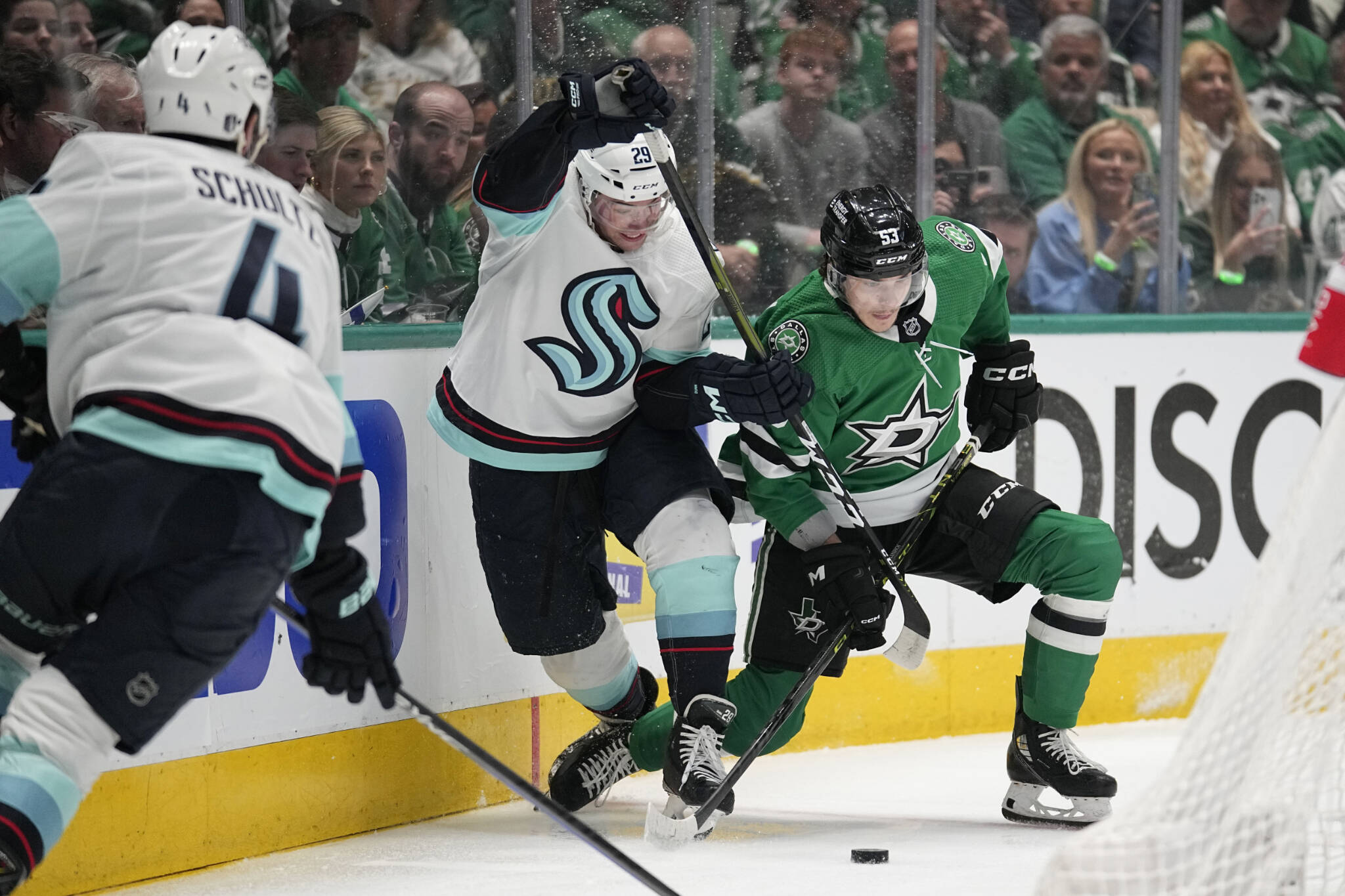Can the Seattle Kraken defy hockey logic?
The conventional wisdom in today’s hockey world, whether that’s the NHL, the WHL or any other level, is that once the postseason arrives, a team needs stars to win a championship. When coaching staffs have time to focus on one opponent during a best-of-seven series, to learn and counter all a team’s tendencies, it’s the individual moments of brilliance only stars can produce that prove the difference.
The Kraken? Not only do they not have a Sirius-brightness star like Connor McDavid or Auston Matthews who illuminates the night sky all by himself, they don’t even have a brown dwarf-level star that can’t be seen without the aid of the Hubble telescope. The closest thing the Kraken have to a star is Jared McCann, who never scored more than 27 goals in his previous seven seasons in the NHL, and who’s missed most of the playoffs because of injury.
We’re talkin’ starless in Seattle.
And yet here we are, the Kraken having upset the defending Stanley Cup-champion Colorado Avalanche in the first round, and now returning home for Sunday’s Game 3 of their second-round playoff series against the Dallas Stars with the series knotted at 1-1.
How has this happened? Seattle’s secret weapon is its depth, and we’re about to find out whether this is just a cute postseason story, or whether the Kraken can turn the firmament upside down and trump quality with quantity.
The evidence strongly suggests stars are needed to lift Lord Stanley’s Cup. As hockey has evolved more and more into a speed and skill sport, champions have been built on the shoulders of their stars. The Nathan MacKinnon-Mikko Rantanen-Cale Makar Avalanche from last season. The Nikita Kucherov-Victor Hedman-Andrei Vasilevskiy Tampa Bay Lightning in 2020 and 2021. Sidney Crosby’s Pittsburgh Penguins and Alexander Ovechkin’s Washington Capitals.
The closest thing to a star-free team to lift the cup in recent years was the 2019 St. Louis Blues, and while they may not have had any grade-A stars, they had the next-best thing in the likes of Ryan O’Reilly, Vladimir Tarasenko and Alex Pietrangelo.
Seattle doesn’t have any players like those mentioned above. But what the Kraken have that no other team still alive in the playoffs has is balance. The dropoff from Seattle’s No. 1 forward to No. 12 is almost imperceptible.
This was the difference against the Avalanche. Colorado is stacked at the top. MacKinnon and Rantanen still anchor the Avalance’s top line. Makar still marshals the blue line. MacKinnon and Rantanen both outpointed Seattle’s top scorer by at least 35 during the regular season, and Makar was just four behind McCann’s Kraken-leading 70, despite missing 22 games and being a defenseman.
But look at Seattle’s scoring totals. The Kraken had 10 forwards register at least 35 points during the regular season. That doesn’t include Eeli Tolvanen, who was plucked off waivers mid-season and contributed 27 points in just 48 games. Colorado has the big scorers, but the Avalanche had just six forwards crack 35 points this season. Seattle may not have a No. 1 line that matches up with other playoff contenders, but the Kraken can ice four lines that are of second- or third-line quality. Seattle coach Dave Hakstol doesn’t have to worry about sheltering anyone.
So what happened in the first round? Seattle rolled four lines, sending its forwards flying into the offensive zone with an aggressive forecheck to create chaos, while Colorado skated its top players into the ice. The Avalanche’s top four forwards all averaged more than 20 minutes a game, with MacKinnon leading the way at an exhausting 23:44. Through eight playoff games Seattle had no forward average more than Yanni Gourde’s 20:39, and the Kraken had eight forwards who averaged at least 14 minutes per contest.
During the third period of Game 7, I saw a tweet that said, “Feels like the third period is just about waiting for MacKinnon and Rantanen to come back on the ice. Avs legit have nothing else after them.” Seattle, clinging to a one-goal lead in a do-or-die game, continued to send all their guys out. Everyone was in rhythm from having seen plenty of minutes throughout the game, but they were also adequately rested so that they had something left in the tank at the end. The Kraken prevented the defending champs from getting any good looks at goal, easily could have added to their lead, and marched into the second round.
As Hakstol said about Seattle’s depth prior to Game 2 against Dallas: “Everybody knows they have to do their part.” Amen.
Can the Kraken keep it up against Dallas? It’s going to be a tougher task. The Stars are a deeper team than Colorado because they are healthy and fully available, while the Avalanche were forced to play Seattle without some of their top players. And while Dallas doesn’t have a MacKinnon, its top players — Matt Robertson, Joe Paveliski, Miro Heiskanen — shine significantly brighter than Seattle’s.
But it will be fascinating to watch. The longer the series goes, the more it’s going to favor the team with the most depth. And as the first round showed, when depth becomes the key factor it’s going to favor the Kraken.
Follow Nick Patterson on Twitter at @NickHPatterson.
Talk to us
> Give us your news tips.
> Send us a letter to the editor.
> More Herald contact information.

























